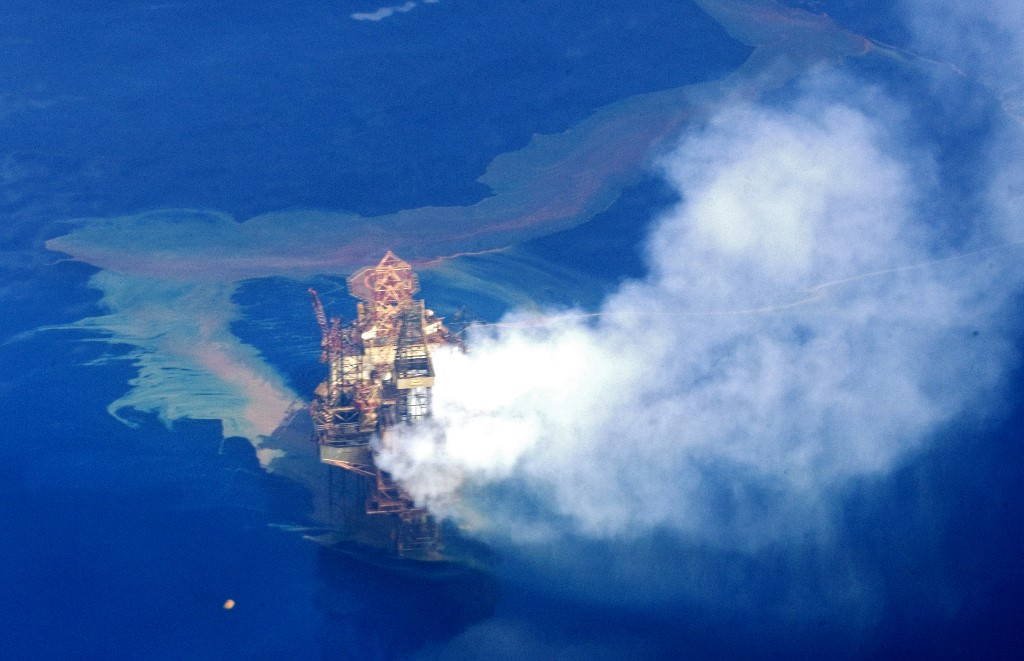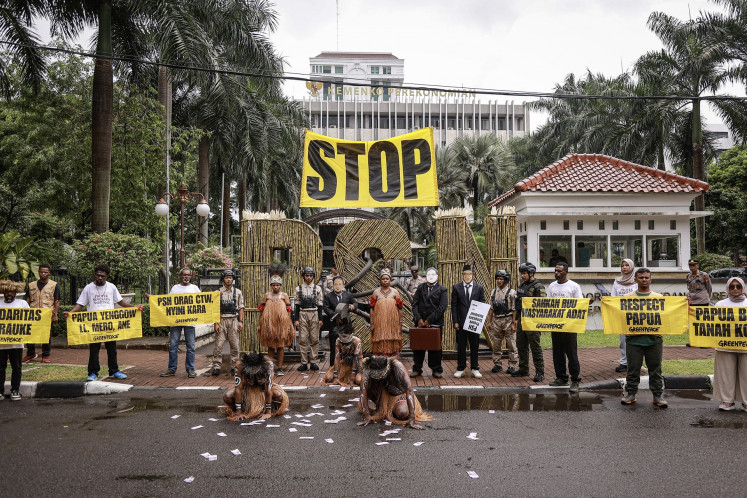Popular Reads
Top Results
Can't find what you're looking for?
View all search resultsPopular Reads
Top Results
Can't find what you're looking for?
View all search resultsMontara and environmental justice
The Australian Federal Court's landmark ruling in the Montara oil spill case could set a precedent for environmental justice in Australia and Indonesia, especially in class actions that pit the "little people" against big business.
Change text size
Gift Premium Articles
to Anyone
 This handout photo taken on Sept. 28, 2009 and provided by the World Wildlife Fund (WWF) shows oil leaking from the West Atlas offshore rig operating the Montara oil field in the Timor Sea. In a landmark ruling on March 19, 2021, nearly 12 years after the oil spill, the Federal Court of Australia has awarded damages to a class action lawsuit filed by 13,000 seaweed farmers in East Nusa Tenggara. (Handout/WWF via AFP/Annabelle Sandes)
This handout photo taken on Sept. 28, 2009 and provided by the World Wildlife Fund (WWF) shows oil leaking from the West Atlas offshore rig operating the Montara oil field in the Timor Sea. In a landmark ruling on March 19, 2021, nearly 12 years after the oil spill, the Federal Court of Australia has awarded damages to a class action lawsuit filed by 13,000 seaweed farmers in East Nusa Tenggara. (Handout/WWF via AFP/Annabelle Sandes)
A
n Australian court has granted a rare win to thousands of seaweed farmers in East Nusa Tenggara (NTT) who have been affected by the 2009 oil spill at the Montara oil field in the Timor Sea, off the northern coast of Western Australia.
It was first thought to be an impossible endeavor, as history has shown that such lawsuits rarely succeeded.
In a statement received by The Jakarta Post on Sunday from Maurice Blackburn Lawyers, the law firm representing the seaweed farmers at the Australian Federal Court, said the case was the first environmental class action on cross-border pollution-related damages to go to trial against an Australian company – and win.
Federal Court Justice David Yates ordered PTT Exploration and Production Australasia (PTTEP) to pay Daniel Sanda, who filed the class action representing 13,000 NTT seaweed farmers, around Rp 252 million (US$17,533) as compensation for damages and losses between 2009 and 2014 caused by the oil spill.
The court’s decision, which comes 12 years after the disaster, could set a solid precedent for other farmers who have also been demanding compensation for the damage the disaster has done to their property and lives.
Other Indonesians have not been as lucky. In class-action suits against local companies and administrations, ordinary people have rarely won.
For example, Riau residents have filed several class actions against local companies and administrations with the Indonesian courts since 2005, in relation to the forest fires and haze disasters that have become regular in the province, but to no avail. Jakarta residents have also sued the government through the years in relation to the severe flood disasters they have endured almost every year.
The only case that ordinary people have even come close to winning is the class action filed by the residents of Bukit Duri who were evicted from their homes in 2016. In 2017, the East Jakarta District Court ordered the Jakarta administration, the Ciliwung-Cisadane River Basin Office (BWSCC) and the National Land Agency (BPN) to pay compensation of Rp 200 million (US$14,285) to each of the 93 plaintiffs.
The Jakarta High Court upheld the verdict, but the Supreme Court later overturned it, saying that the lower courts did not fulfill the judicial standards in handling the class action.
In fact, arguments on substandard case management from both plaintiffs and courts have been used to void many class actions related to environmental disputes that residents have lodged against corporations or local administrations.
The cul-de-sac in environmental justice does not stop there. The Institute for Policy Research and Advocacy (ELSAM) recorded acts of violence against 127 green activists that were perpetrated by the state or private institutions. In the first four months of 2020 alone, at least 69 activists fell victim to violence during environmental disputes, while other activists have been criminalized for taking their fight against corporations or the state to court.
The decision regarding the Montara class action has restored faith in environmental justice, no matter how long the court cases might take. The Federal Court’s verdict should serve as a reminder for governments and the private sector in both Indonesia and Australia that people’s wellbeing should come first in business.
Making sure that environmental justice is served is critical to ensure business sustainability, which is why environmental, social and corporate governance (ESG) criteria has gained traction as a business standard. After all, business in intended to improve people’s welfare, not endanger their lives or the environment in which companies work.









